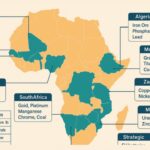Nigeria is intensifying efforts to expand broadband coverage nationwide, positioning digital transformation as a driver of socio-economic growth. Authorities see reliable high-speed internet access as a key pillar of this transition.
The Nigerian Communications Commission (NCC) announced plans on October 8 to launch a Digital Connectivity Index by the end of the year. The index will rank the 36 states and the Federal Capital Territory based on their broadband readiness and performance in digital infrastructure.
Executive Vice Chairman Aminu Maida presented the initiative at a roundtable in Abuja titled “Enhancing Investments in Broadband Connectivity and Protecting National Critical Infrastructure.” He said the tool will promote accountability, attract investment, and encourage states to adopt pro-investment policies to expand connectivity and empower citizens.
Maida told The Punch that the initiative serves as more than a simple performance chart, describing it as “a practical guide for states to position themselves in Nigeria’s digital economy.” He said states that embrace investor-friendly policies would “draw more telecom players, accelerate broadband rollout, and open up new digital opportunities,” while those that hesitate “could miss out on the country’s fast-moving tech transformation.”
Local media reported that the index will assess factors such as right-of-way fee waivers, infrastructure protection, regulatory efficiency, coordination between agencies and operators, and energy resilience at network sites.
The index will complement the NCC’s upcoming Ease of Doing Business Portal, designed to centralize information for telecom operators and investors. The portal will provide guidance on broadband approvals, right-of-way requests, and regulatory procedures across all states.
The federal government is also advancing the $1.6 billion BRIDGE project, which aims to extend Nigeria’s fiber backbone by 90,000 km—from 35,000 km to over 125,000 km. The goal is to reach 70% of the population in the coming months, closing connectivity gaps in underserved areas.
Private investors will provide $1.1 billion of the total financing, while the African Development Bank, European Investment Bank, and Islamic Development Bank will contribute additional funds. The World Bank approved $500 million in financing for the project in late September.
The National Broadband Plan 2020–2025 aims to deliver download speeds of 25 Mbps in urban areas and 10 Mbps in rural regions. It also targets 70% broadband penetration and coverage for 90% of the population. As of August 2025, Nigeria had 105.1 million broadband subscribers, representing a 48.81% penetration rate.
Cc: This article was initially published in French by Isaac K. Kassouwi
Adapted in English by Ange Jason Quenum



